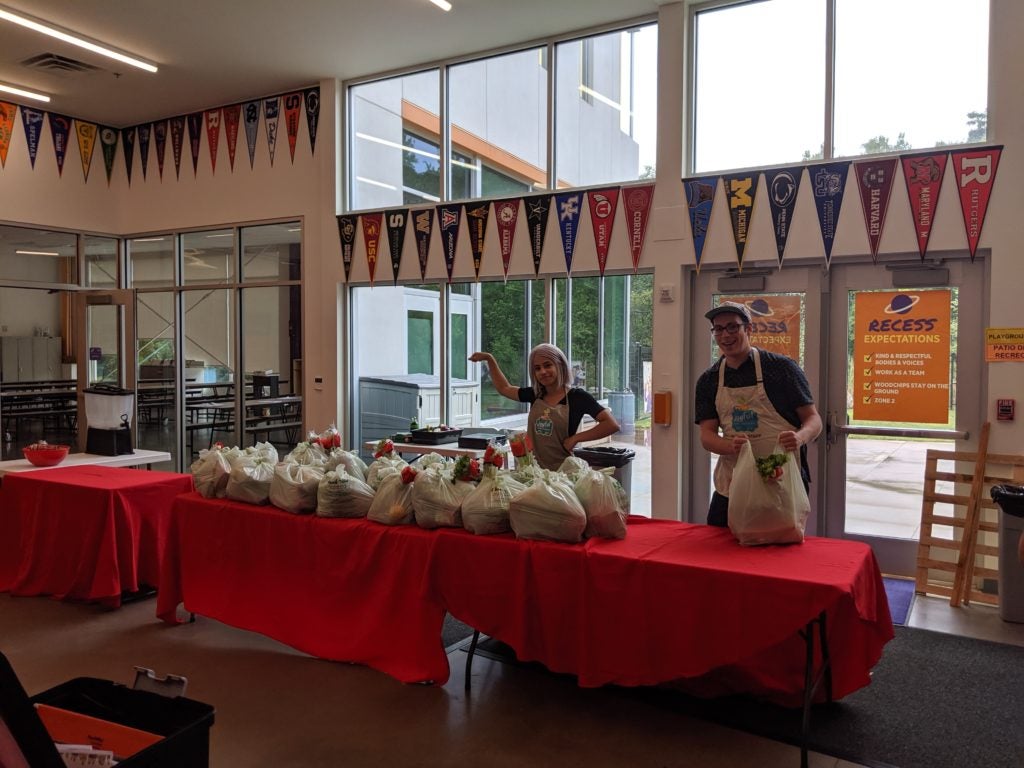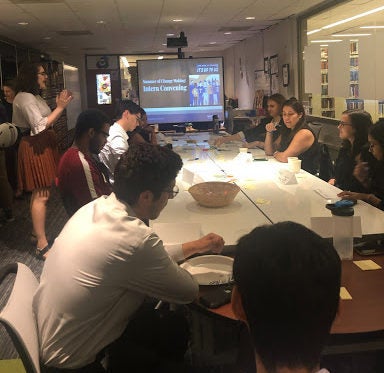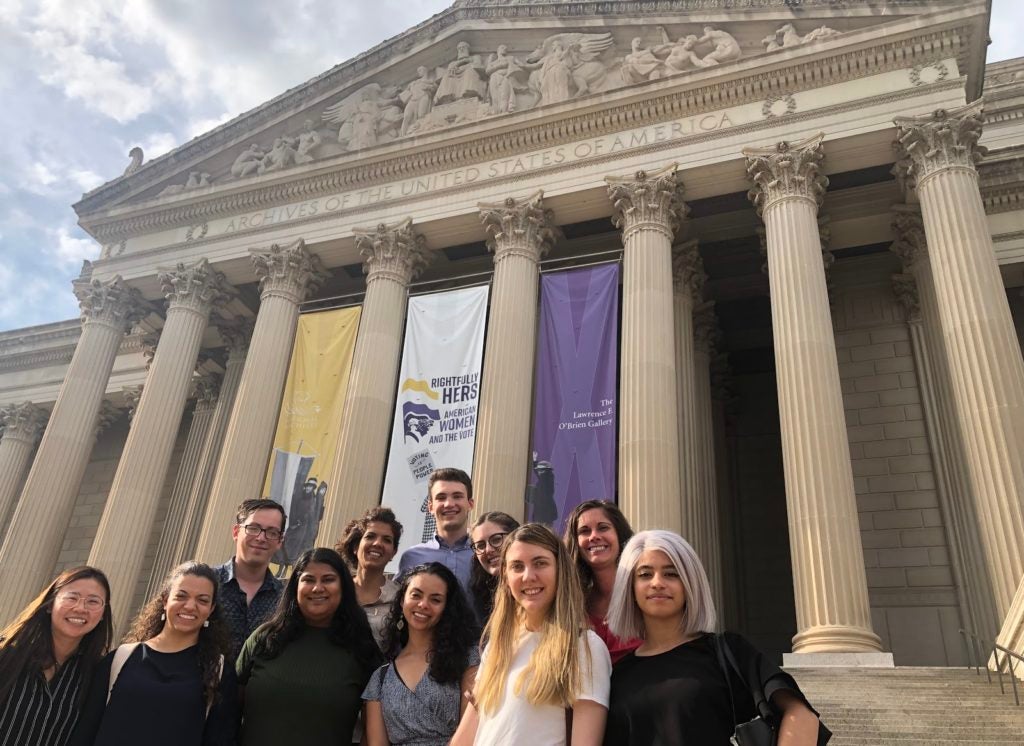Joining the Community of Data Governance and Digital Services Leaders
September 2019
We are well into the fall semester here at the Beeck Center and we are grateful to our six student analysts who spent their summer with us for all of the energy, passion and thoughtfulness that they put into the Data + Digital Portfolio. From their first explorations of the digital government space to becoming active participants in this movement, our student analysts spent their last month of the summer strengthening relationships and building their community(ies). They rounded it out by engaging more deeply in the larger D.C community, fostering cross-collaboration in the civic innovation space, and finishing up their summer capstone projects.
The Beeck Center’s Data + Digital work includes supporting efforts in the public and private sectors to responsibly share and use data to address some of society’s most challenging issues, as well as creating tangible resources and cultivating the community for government digital service leaders to help them share and scale efforts. Our student analysts led research projects around data governance, digital service product rollouts, and service design as a tool for career planning. Learning these skills is a vital part of our mission to create social impact leaders of tomorrow, and we’re excited to have the students share their experiences.
—Vandhana Ravi, Data + Digital Program Associate
August was the final month of our stint at the Beeck Center, which meant we were especially busy as we worked on finishing and polishing our different projects and initiatives. A large part of the month was also dedicated to documenting all our learnings in order to both showcase our work but also paving the road for the next team of student analysts joining the Beeck Center in the fall.
Learning and orienting within a larger community
The opportunity to experience social impact firsthand was one of the highlights of August. We were able to participate in social programs in the Washington, D.C. community and see the impact that organizations can have in local communities. In August, we volunteered for Martha’s Table and the DC Dream Center, nonprofit organizations that support communities through access to quality education programs and familial support. Through volunteering and community immersion we learned that it’s not just helping, but integrating techniques of administration and logistics that really make a difference.

Beeck Center Student Analysts at a Martha’s Table Summer Food Market Program in Washington, D.C. on August 13, 2019. Photo by Alberto Rodriguez.
We were also able to see the power of community building first hand, through our continued collaboration with Coding it Forward, an organization that places students into federal government agencies for summer-long fellowships to use their technical skills to improve government practices. The student fellows came from backgrounds such as design, data science, and computer science and the hosting organizations were as varied as the Department of Labor and the National Institutes of Health. On August 8, these Fellows gathered for a ‘Demo Day’ that included a series of presentations and panels discussing their summer fellowships followed by a ‘poster session’ style event where attendees could hear about the projects directly from the fellows. It was inspiring to see how much impact these driven students had made in such a short period of time. We were reminded that, although it seems as if we are fighting an uphill battle, programs like this are evidence of such a strong demand for being in the civic technology space. This bodes well for the future of government and for technologists who want to serve their country by making its government more effective at delivering services.
At a Coding it Forward Summer of Social Impact panel, “Designing with, not for,” we heard directly from professionals who work in the public and private sectors, as well as the world of contracting. We learned their perspectives on how human-centered thinking is applied in their workspaces and how it’s important to use a shared language to connect with the people involved in your work and understand their perspectives.
Working toward a common goal through cross-functional collaboration
We’ve been learning how bureaucratic boundaries are broken by bringing stakeholders from different sectors into the conversation, which is one of the leading ideas at the Beeck Center. As student analysts coming from different cities and backgrounds, we saw how integral cross-functional collaboration is to spark innovation.
Also in August, we participated as facilitators in a Census 2020 Open Innovation Labs design sprint at New America, which aimed to bring together private and social sector teams to create personas to inform new digital tools that leveraging open census data. Each group tackled four different identified problem-areas surrounding the 2020 Census — the digital divide, digital literacy, recruitment of census takers, and reaching hard-to-count communities — and consisted of a user advocate, government expert, technologist, product expert, census expert, and facilitator. By the end of the workshop, we saw how having a diversity of people that are not usually in the same room addressed real issues and approached problems in a variety of ways.
In the pursuit to collaborate with other interns across D.C. doing similar work in social impact, we held a Summer of Social Change Intern Convening. By bringing together 18 interns from 10 organizations and addressing our experiences as new voices in the civic tech realm, we expanded our network and witnessed first-hand that we share a mission to work better for the people we are trying to serve.

Interns from social impact organizations in Washington, D.C. gather in Georgetown’s Lauinger Library on August 6, 2019. Photo by Dennese Salazar.
Synthesizing and presenting research findings
As we familiarized ourselves with the design and research processes and their roles in social impact, we understood how crucial it is to synthesize large quantities of information and present them to an audience. In our roles at the Beeck Center this summer, we each undertook a research project to practice our synthesizing, writing, and presentation skills.
In one of our research projects, we focused on how to better assist early-career job seekers interested in civic tech and government service design positions. To address a student’s career navigation, we made a “How to Get Started in Public Interest Tech” guide designed to break down what we think a student or early career professional would need to get started in these fields. When presenting our findings, we learned how to use the audience to carry out an impromptu beta test to continue iterating on our research.
Another research project consisted of assembling resources to create effective and responsible data-sharing partnerships for social impact. We presented these resources to the Beeck Center staff through a role-playing exercise that split them into teams and assigned them a role and a challenge. Using the resources we gathered in our research project, we asked our participants to brainstorm the advantages and barriers to potential data partnerships. This allowed them to engage with the material in a way that simply hearing about it could not and to see whether some of our theories around our resources would be validated.
One additional area of research centered on analyzing two specific projects in Latin America to improve services to the public by leveraging technology and digital services. We analyzed how Mexico and Argentina have transformed identity paper-based documents to digital national platforms with a goal of creating case studies that can be used by other government teams in the future. In this research, we hope to see common trends and insight that might help governments better implement digital solutions like these or others.

In August, Beeck Center student analysts and staff toured the U.S. National Archives, the home of historical U.S. government records including foundational documents such as the U.S. Constitution.
Wrapping up at Beeck
As we said goodbye after a great summer, and prepared to leave D.C., we wrapped up in the best sense we could think of: by saying thank you to everyone that helped make this summer one of the most memorable in our careers. We are sure that the knowledge and skills that we have developed over the summer will help us bring impact wherever our next step takes us and we are extremely grateful to everyone in the Beeck Center that made it possible.
Student Analysts on the Beeck Center Data + Digital team who contributed to this piece include Margarita Arguello, Kell Crowley, Jillian Gilburne, Alberto Rodriguez Alvarez, Robert Roussel, and Dennese Salazar.